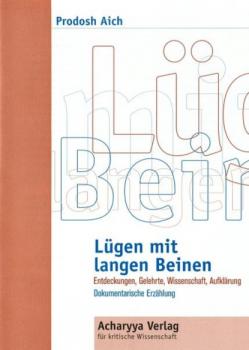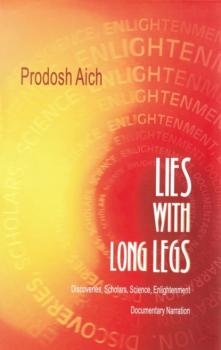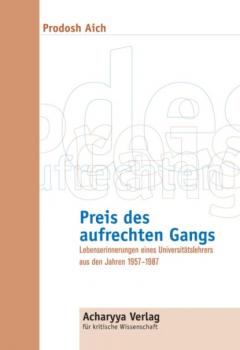ТОП просматриваемых книг сайта:
Prodosh Aich
Список книг автора Prodosh AichАннотация
Wir sind, was wir wissen. Und wir wissen das, was Berufene uns erzählen. Das tägliche Leben wird heute durch «INFORMATION» geordnet. Das Netzwerk des Transports von «INFORMATIONEN» wird immer dichter. Die Übertragungen sind flächendeckend. Rund um die Uhr. Rund um die Welt. Die Menge der «INFORMATIONEN» steigt und alles wird immer unüberschaubarer. «INFORMATIONEN» werden auch vermittelt durch das Elternhaus, durch die Schule, durch das Umfeld, und das nicht zu knapp. Wo kommen die «INFORMATIONEN» her, wo werden sie erzeugt, wer bringt sie in Umlauf, welche Wege nehmen sie, wie lange dauert es, bis eine «INFORMATION» vom Produktionsort das Elternhaus erreicht? Wir wissen es nicht. Ist es wichtig, das zu wissen? Geraten wir so nicht in die INFORMATIONSFALLE? Sind wir uns dessen bewußt? Wollen wir uns aus dieser Falle befreien? Können wir uns befreien? Wie? Wir wollen alles über «Arier», «Indogermanen» und «Indoeuropäer» wissen. Wer sie sind, seit wann es bekannt ist, daß sie es sind, wie ist es bekannt geworden, daß es sie gibt, wer hat sie gefunden, wie und warum und wozu. Und wir finden Geschichten. Wir finden sie in Nachschlagewerken, in den «Standardbüchern der Geschichte» und ausführlicher in den speziellen Geschichtsbüchern. Die Geschichten sind widersprüchlich. Also stellen wir Fragen. Zu Beginn erscheinen uns unsere Fragen einfach. Dem ist nicht so. Aber wir sind weiter gekommen. Durch unsere unüblichen Fragen. Und es scheint, wir haben die Büchse der Pandora aufgestoßen.
Аннотация
We are what we know. We know what is handed down. Our daily life is organised by «historical narrations». Universally. To judge over the validity of «historical narrations» and of history, we must know all about those narrators of history. Today, and during the last two centuries, all narrators of history are educated in institutions created by European Christians. They narrate history incoherently though the history all over is coherent and interdependent. The libraries are flooded by incoherent deliberations and with books that are copied and pasted from other books. This is more so since the rise of the Ottoman Empire, since the blockade of the land route and beginning of search for a sea route to India, and all that has followed thereafter until our days. Why do they narrate incoherently though historical developments are coherent and interdependent by its nature? Why do they copy and paste and duplicate? To judge over the validity of «historical narrations» in their books, the authors of this book search and investigate into the acquired qualifications and «careers» of all main narrators of this history. The search is based on primary documents. The result of this search is thrilling, mysterious and stunning. We are fed by books that are based on secondary sources. These books are mere propaganda, which should be stored in «bad libraries». The result of this search has banged on the Pandora's Box and it is open now.
Аннотация
In his painstakingly long academic journey through mountains of source material available in Europe, Prof Prodosh Aich establishes that the entire understanding of India developed by self-claimed scholars from West is erroneous, since the initial attempt to comprehend ancient India through the Vedas was itself faulty. He questions the validity of the works of the famous western scholars who translated the Vedic literature into English, German and Italian. A vast majority of them did not even set foot on the Indian soil and those who came here did not learn the ancient languages in an organised manner, even though translation needs an equal command of both languages. Since neither the Vedic language nor the Sanskrit were spoken languages since ages, it was all the more difficult for them to develop language skills required for translation. Colonialist Imperial England had prepared a concerted design to establish the superiority of blond-blue eyed-white-Christian culture over other cultures that they opted to define as «primitive», particularly in case of India. Prof Aich uses juxtaposition to drive home a point and leaves judgement to readers. He frames a question and then answers it by using the primary source material. The book is bound to trigger an academic debate in the West also and would go a long way to establish once for all that the much-trumpeted and self-championed discipline of Indology in the West has in fact been based on falsehood. It must have been a design that none of the scholars so far bothered to use the existing material, so abundantly available, which could have helped to unravel the truth about the colonial powers and imperial administration and bureaucracy. Scholars after scholars, even after the end of colonial empire, have continued to overlook the material that would have removed the well-laid myths about Indian society, polity and culture.
Аннотация
Es ist eine politische Neuerscheinung über praktizierten Alltagswiderstand. In Deutschland, wo das Fehlen von Zivilcourage beklagt wird. Schon immer und regelmäßig. Aber keiner beschreibt das Umfeld, den kulturellen Hintergrund, der Zivilcourage erst möglich macht. Und vieles, was damit zusammenhängt. Preis des aufrechten Gangs, eine dokumentarische Erzählung aus den Jahren 1957-1987. Das Buch erzählt Zeitgeschichten über Wissenschaftsbetriebe, Wissenschaftler, Politiker, Richter, Staatsanwälte, Rechtsanwälte und Medienvertreter. Auch Geschichten über das Hegen und Pflegen des kolonialen Erziehungssystems in der Dritten Welt durch Wissenschaftler und Politiker der Ersten Welt. Es sind vor allem auch Geschichten über Moral. Ich lebe in Deutschland länger als die meisten Deutschen. 45 Jahre. Nichts war mir in Deutschland selbstverständlich und vertraut. Ich hatte eine kulturelle Distanz zu den hiesigen Ver-hältnissen. Jede mich unmittelbar betreffende Ungereimtheit hat mich zum Widerspruch provoziert, nach dem Motto: nicht mit mir. Mein Erfahrungsschatz ist angefüllt mit Konflikten. Und dokumentierbar. Soll ich diesen Erfahrungsreichtum mit ins Grab nehmen? Darf ich es? Nun liegt die dokumentarische Erzählung vor. Unzensiert. In meiner Erzählung kommen Leute in großer Zahl vor, die auch wichtige Autoren sind. Verlage nehmen Rücksicht. Schenken aber nicht reinen Wein ein. Kurz: BoD hat diese dokumentarische Erzählung möglich gemacht.




